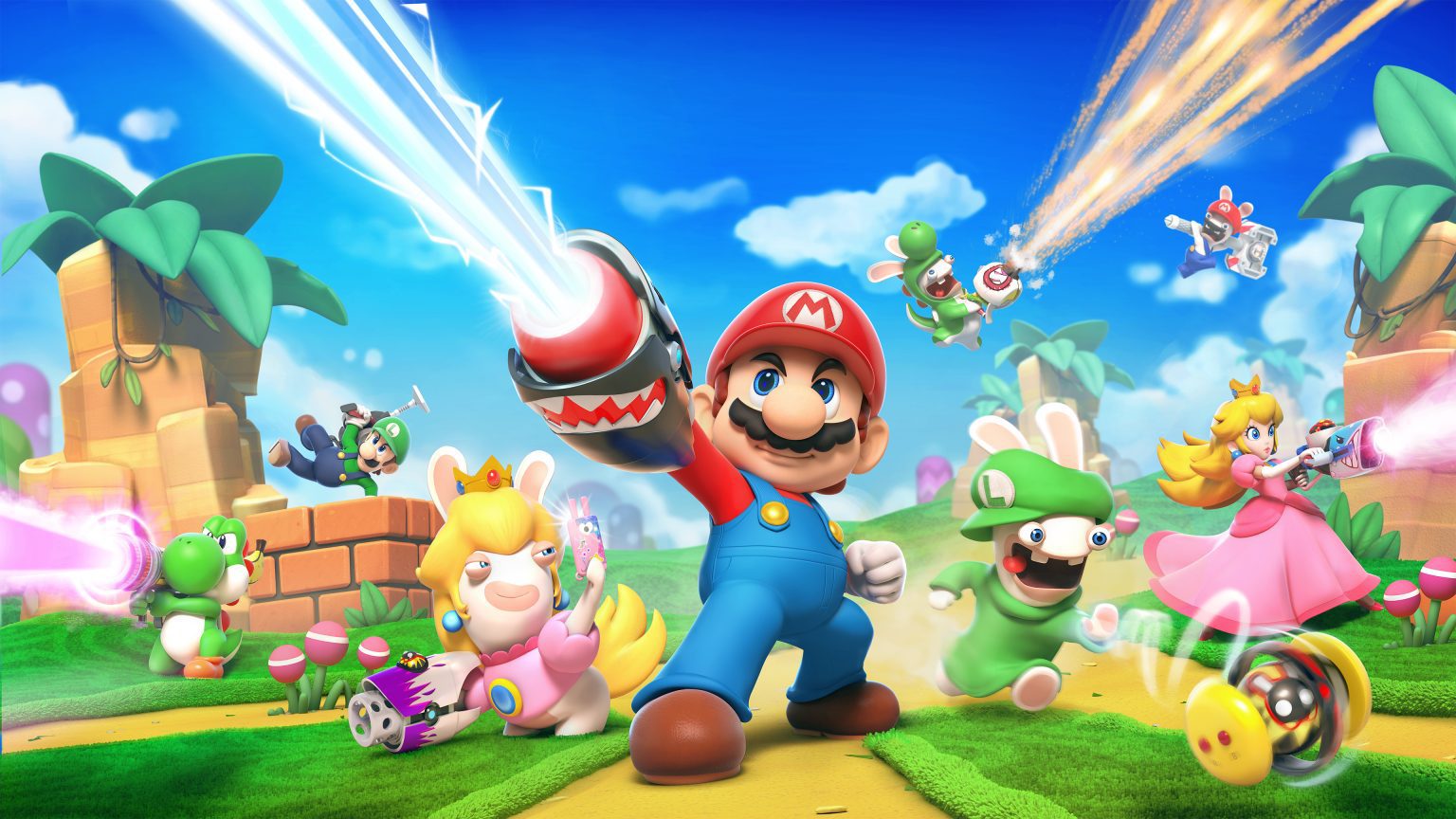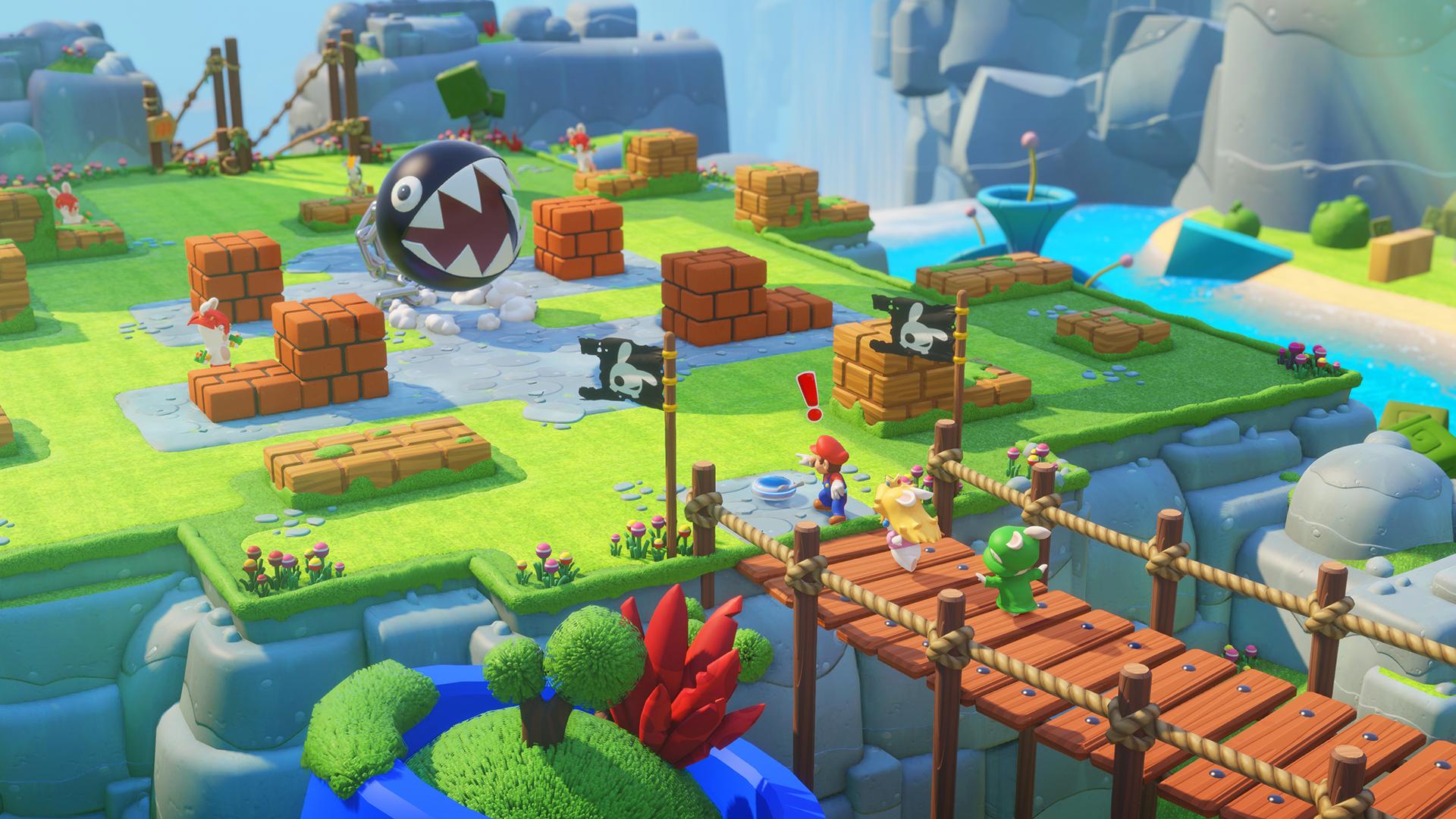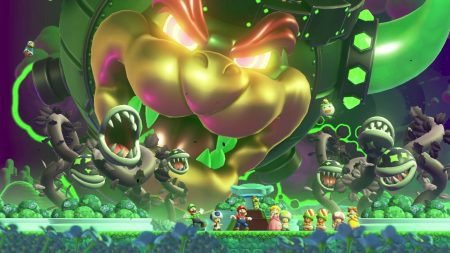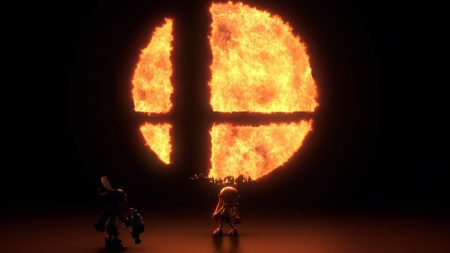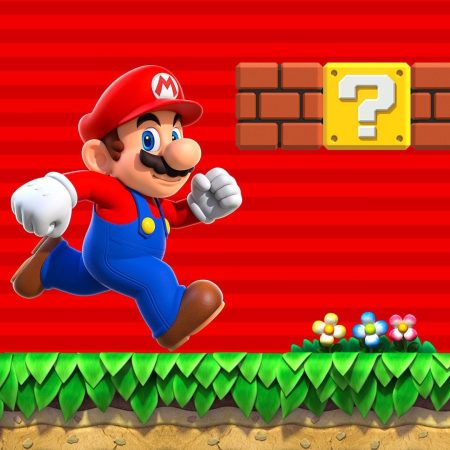A Most Unexpected Alliance
A few months ago, you’d be hard-pressed to find the words ‘Mario’ and ‘Rabbids’ spoken in the same sentence. Fast-forward to a few weeks back, and the two could hardly be uttered while keeping a straight face.
One of the worst-kept secrets of E3 2017, Mario + Rabbids: Kingdom Battle leaked weeks before the annual Los Angeles convention took place. The game, which had been confirmed by everything short of an official Ubisoft announcement, was quickly becoming the butt of internet jokes worldwide.
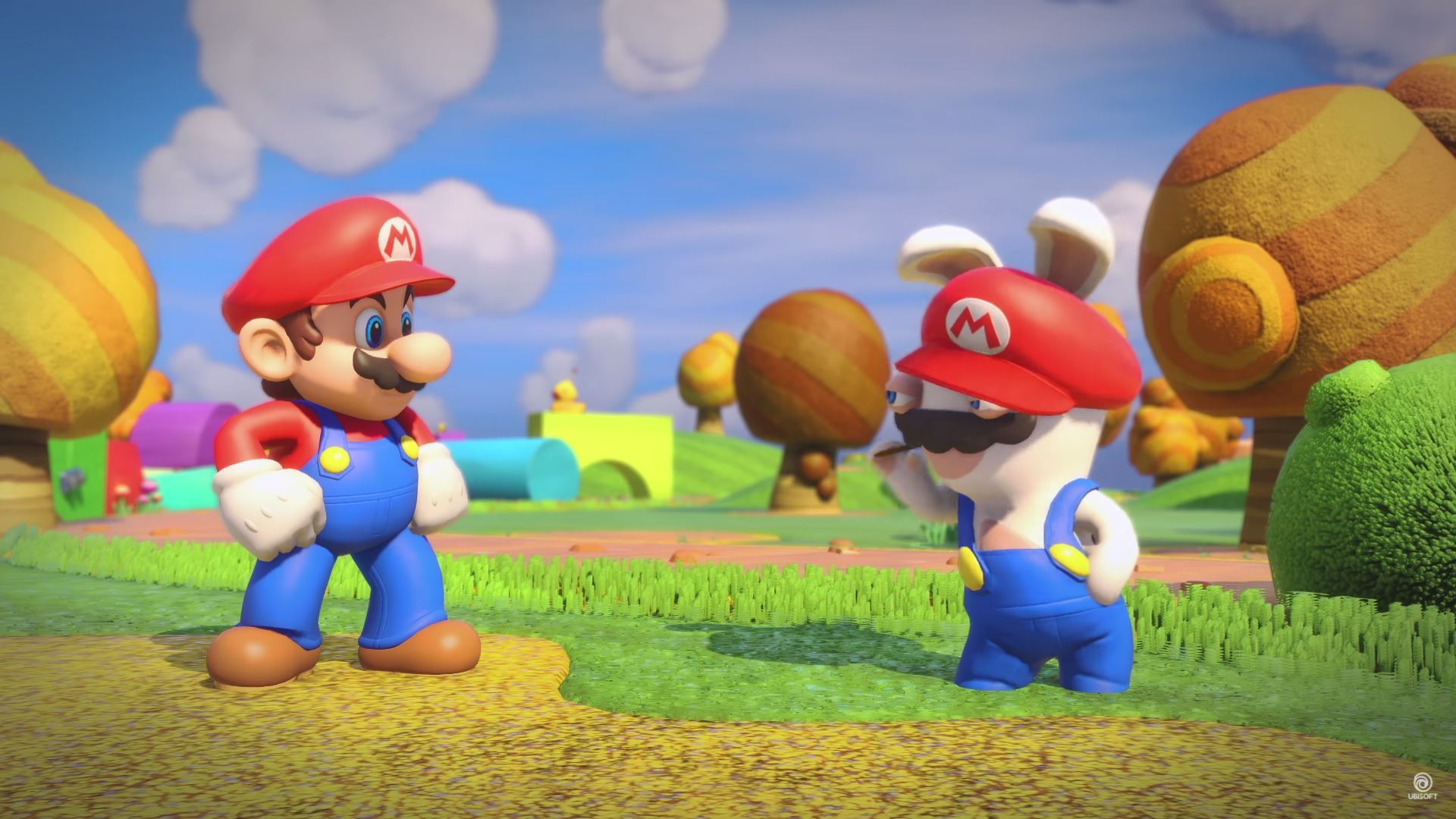
Nintendo Switch fans eager for something to play following the excellent Breath of the Wild chastised the collaboration as feeling both out of touch and out of left field. Many thought the game sounded too simplistic, claiming it would be nothing more than shovelware designed for younger audiences.
When the game was finally unveiled on-stage at E3, complete with gun-toting cameos from Yves Guillemot and Shigeru Miyamoto, fans and critics alike found themselves pleasantly surprised. The game looked to be taking far more cues from XCOM and Mario & Luigi than Rayman: Raving Rabbids and Mario & Sonic. Better yet, the game actually looked fun to play.
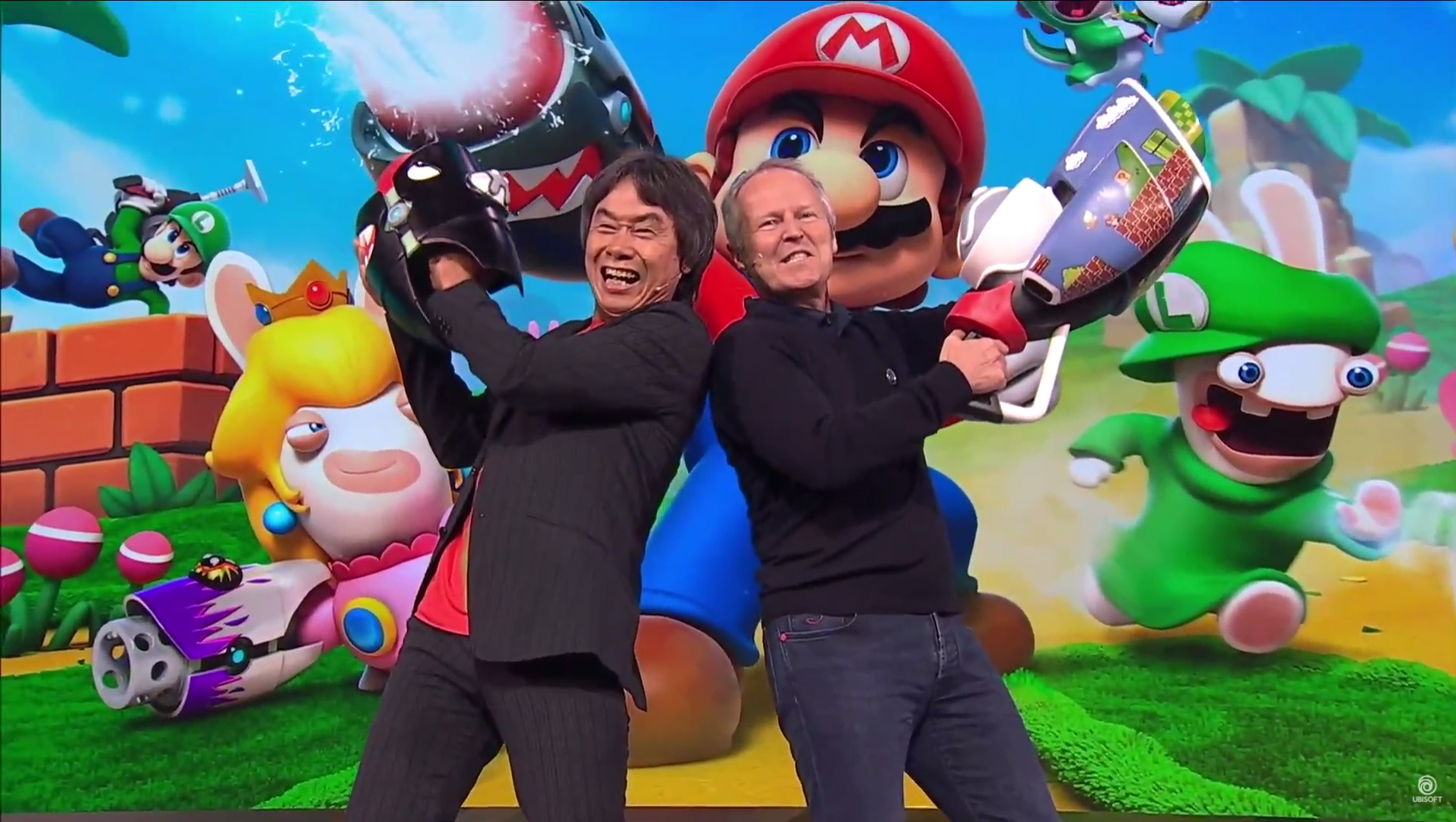
With a short lead-up between its impressive June showing and August release, only one question remained: would the final game be as good as it looked?
While not without a few missteps, chiefly in its presentation and exploration, Mario + Rabbids successfully delivers on its promises. Not only is it fun to play, it shows a degree of depth normally reserved for only the most hardcore of Mario games. It’s also funny, to boot.
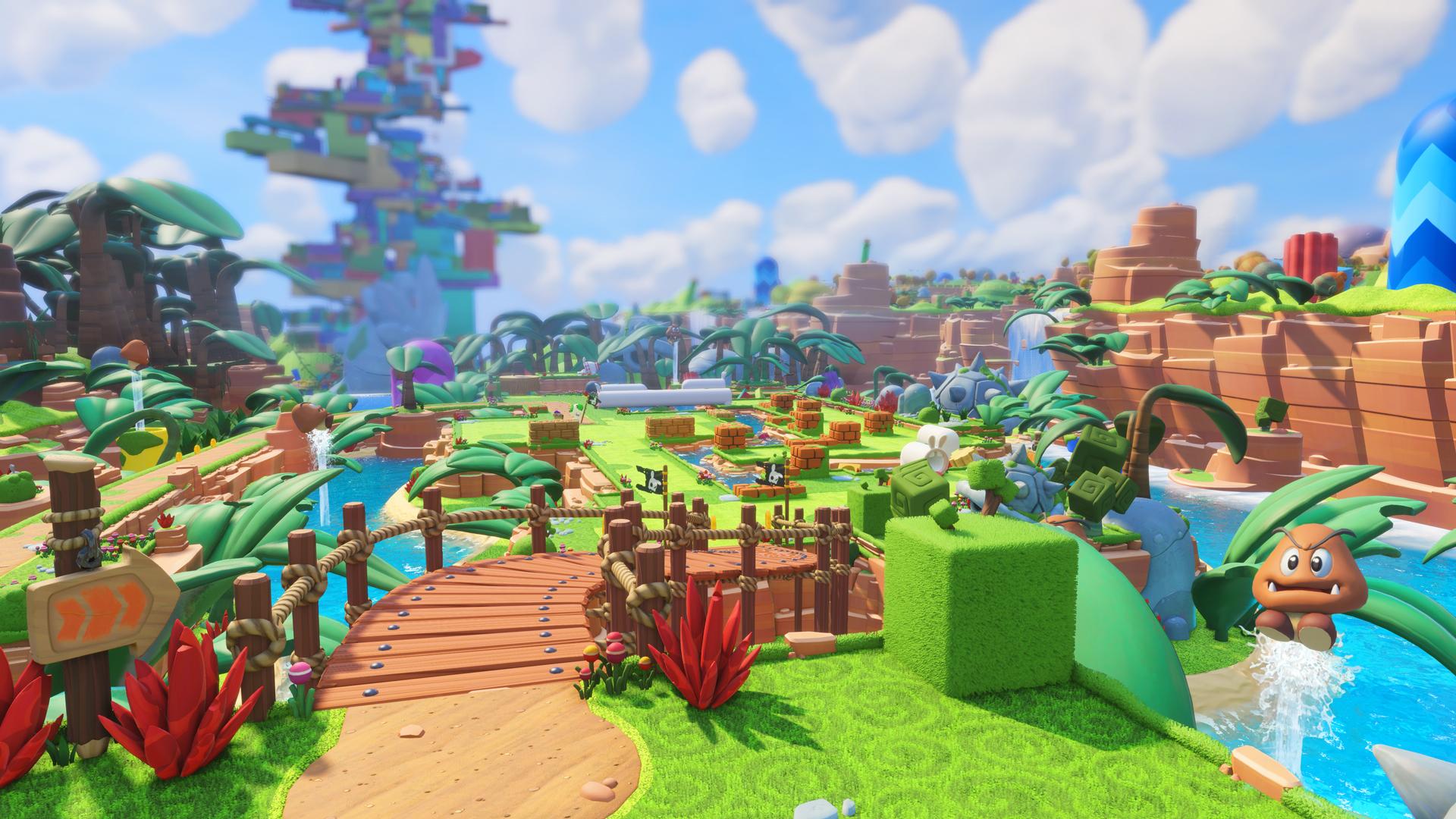
A Kingdom in Chaos
Kingdom Battle’s premise is as well-traveled as they come. A young, girl-genius is close to perfecting a technology that will catapult her to scientific stardom. Her device takes two objects and morphs them together, creating endless possibilities for harnessing energy and creating McGyver-like objects and tools.
As with all seemingly perfect plans, things go awry. Just as the girl leaves to get some sleep, a group of time traveling Rabbids appear in her basement and get their hands on the machine. Their time traveling vehicle of choice, a washing machine, gets mixed with a collectable statue of Mario on the girl’s desk, and before long the Rabbids find themselves teleported to the Mushroom Kingdom, wreaking havoc upon the land and its denizens.
From here, a pair of mashed-up Rabbids of Luigi and Peach find themselves face-to-face with the Italian plumber himself. Forming an unlikely alliance, the three set out at Princess Peach’s request to find the mashup machine, reverse its effects, and save Mushroom Kingdom.
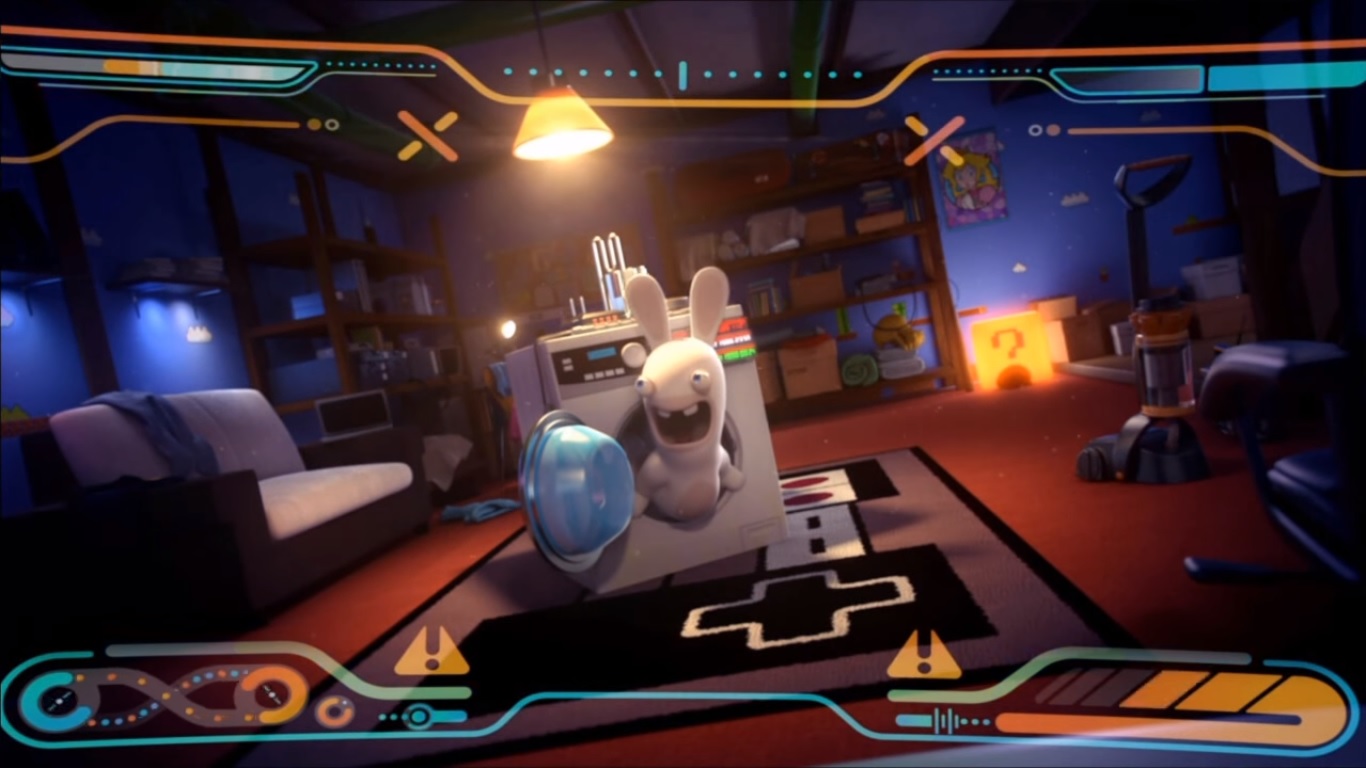
If the story here seems a bit forced, that’s because it is. To be fair, how else could Ubisoft and Nintendo hope to have their mascots unite in the same world against a common enemy? In truth, Mario games have never relied on their storytelling for emotional impact. In that respect, the story of Kingdom Battle fits right in with the rest of the Mario Brothers’ adventures.
While light on narrative, Kingdom Battle’s story remains entertaining throughout thanks to humorous characters, namely from Rabbid Peach and regular-old Luigi, a duo whose goofy antics and clumsiness know no bounds.
The game also sports a healthy number of short cutscenes, a stark difference from its Mario source material that ends up working out for the better. These moments provide context to what is essentially just a string of battles between Mario and his opponents, while driving home the refreshing, off-brand humor unique to Ubisoft’s Paris and Milan teams.

Very Mario Indeed
As mentioned before, Mario titles aren’t known for their emotional narratives. The feelings of joy, awe, and wonder players exhibit while playing a Mario game are achieved through just that: playing the game.
As luck would have it, Kingdom Battle adopts this same philosophy and benefits greatly from it.
The core gameplay structure is similar to any platforming Mario game in recent years. As Mario, led by the magical cursor BEEP-0, players navigate a series of worlds, each with their own “levels” of varying difficulty. In between worlds, players have the chance to explore a hub area around Peach’s castle, outfit party members with new equipment, and access new worlds and levels.

Think Super Mario Galaxy 2, except without any of the platforming (or lack of gravity). In fact, aside from its hub and level structure, Kingdom Battle abandons all platforming characteristics of Mario games past in favor of something wholly unique. Rather than stomping on Goombas and gaining power-ups, Kingdom Battle showcases a slick turn-based combat system in the vein of XCOM and Fire Emblem.
Levels are broken down into two components: exploration and combat. While traversing one of Kingdom Battle’s four worlds, players make their way from battlefield to battlefield, fighting progressively harder enemy Rabbids that eventually ends with a boss battle.
Tactical Mayhem
Battles play out in the form of a top-down strategy game. As BEEP-0, players direct where Mario and company move from turn to turn, firing at enemy Rabbids while attempting to complete certain objectives. Some matches may task you with clearing all enemies, while others may simply ask you to escape the battlefield unharmed.
As with XCOM and Fire Emblem, positioning your characters properly is key. Utilizing high ground and flanking enemies from behind greatly increases a character’s odds of hitting them. At the same time, get flanked yourself, and you’ll find yourself in a sticky situation.
Two unique additions to movement in Kingdom Battle include the dash and team jump. By running into an enemy, a character automatically initiates a dash, dealing additional damage on the way from point A to point B. This could help chip away at a particularly tough enemy, or finish off a weaker baddie without wasting a character’s shooting/melee action for the turn.

The team jump, meanwhile, has even bigger ramifications as matches play out. By running into a teammate, players can initiate an action where the stationary character propels the moving one into the air. This jump allows a character to move additional tiles and access higher terrain.
These mechanics all combine to form a movement system that feels both strangely familiar and wholly unique. Vying for control of the map is a stalwart strength of any strategy game worth its salt, and Kingdom Battle absolutely has this in spades. Battles are a fast and frenetic mix of movement and shooting that kept me gripped to my Switch screen, double and triple checking my decisions during many of the game’s tougher challenges.
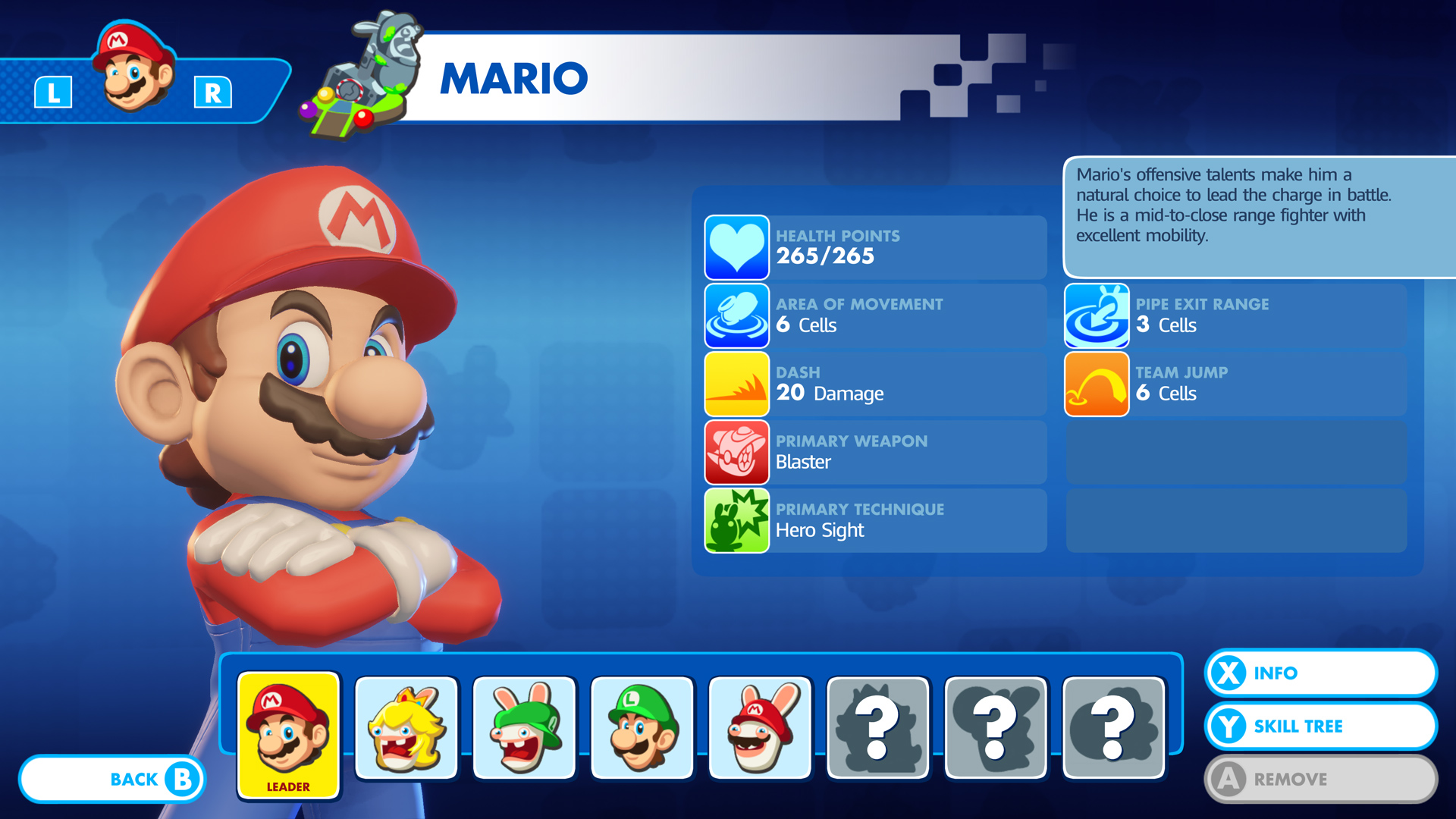
Helping to keep things from feeling stale from world to world, Kingdom Battle gradually introduces new mechanics over the course of its lengthy campaign. By collecting skill points, players can develop each of the eight available party members how they see fit. Mario, for example, has the ability to stomp on enemies when executing a team jump, while Luigi can execute multiple team jumps in a single turn. Meanwhile, Rabbid Peach, in addition to being able to perform multiple dash attacks in a turn, can heal friendly party members.
With its strong base gameplay and additional character building, Kingdom Battle showcases a stellar combat system that rewards wit and ingenuity while remaining accessible to newcomers. The result is some of the most fun gameplay I’ve had on my Nintendo Switch to date.
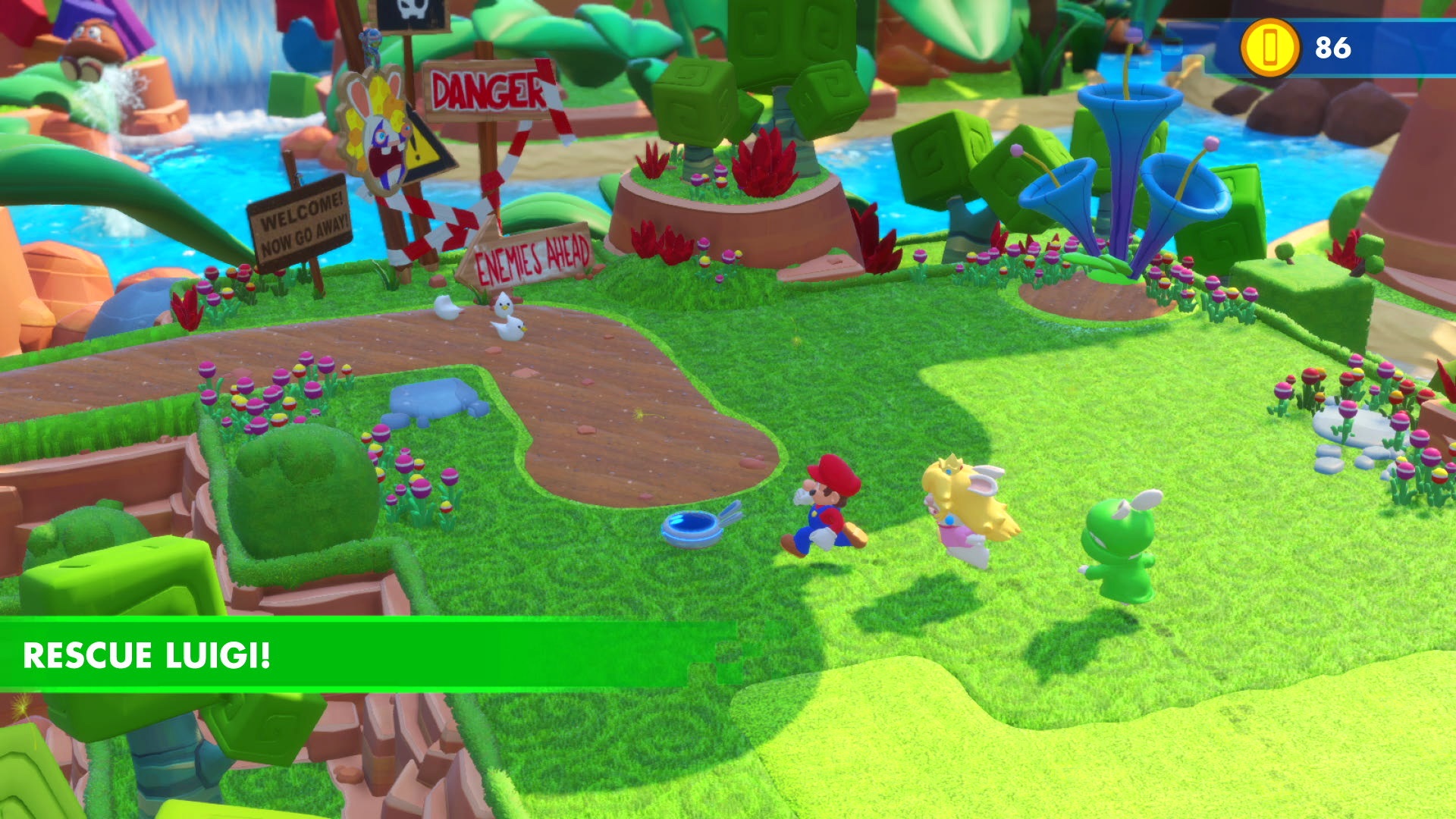
Exploring the Mushroom Kingdom
Between these satisfying battles, Kingdom Battle also tasks players with exploring the Mushroom Kingdom. Whether solving light puzzles, collecting coins, or discovering hard-to-reach treasure chests, the exploration of Kingdom Battle serves as a necessary palate cleanser between the game’s hard-fought skirmishes.
That said, when juxtaposing these moments outside of battle to the battles themselves, it’s hard not to be a bit disappointed. For a game based on a series of imaginative platformers, Kingdom Battle’s game world seems tragically unimaginative by comparison.
Coins lay out in front of the player in predictable fashion, as if the developers had been too lazy to hide them. Puzzles are shockingly simple compared to the clever, strategic puzzles encountered in battle, and oftentimes, finding ‘hidden’ treasure chests is a matter of simply walking down the other path of a fork in the road.
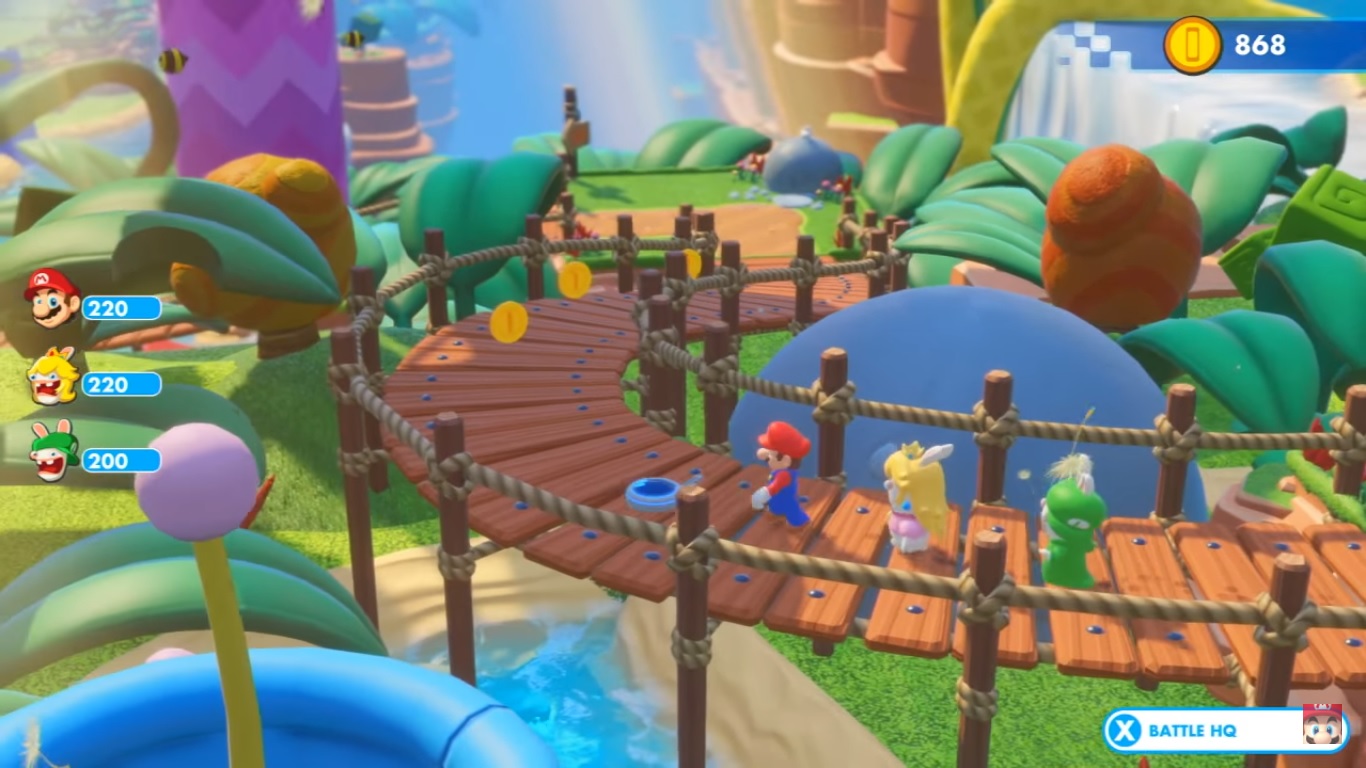
Worse yet, upon opening one of these many chests, players are met with one of several identical looking cards representing a new weapon, collectable figurine, or sound test CD. While the rewards themselves are useful, that Ubisoft opted to forgo dedicated textures and models during these Zelda-like moments in favor of a generic ‘IOU a prize’ is nonetheless disappointing.
Isolating any of these issues individually might come across as nitpicky. In truth, none of these issues are major, a testament to the strength of the core game in question. However, taken together, these exploration hindrances pulled me out of what was otherwise a fantastic and immersive experience.
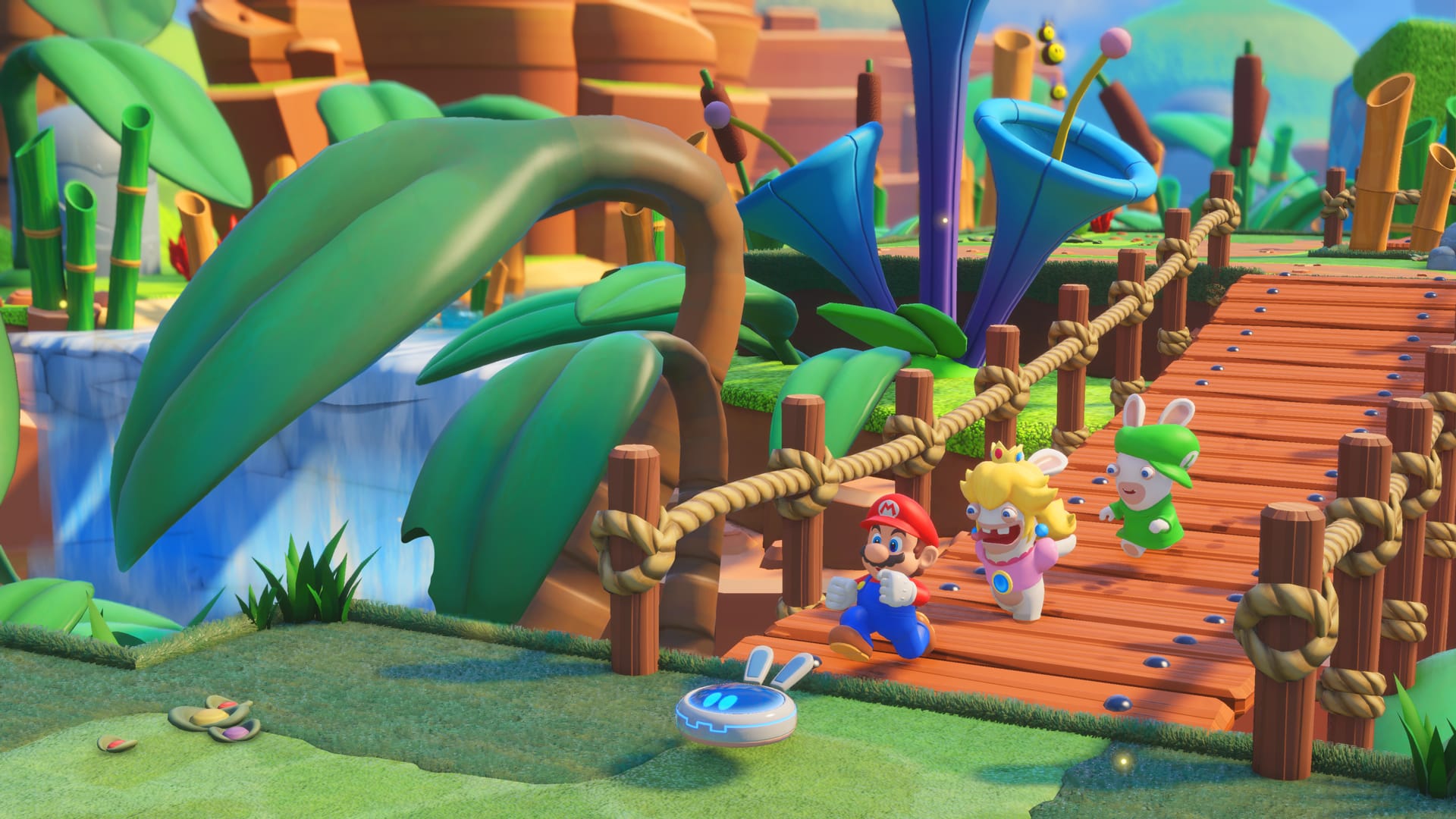
The Lush Kingdom, And Its Generic Vibes
In addition to its exploration woes, Kingdom Battle’s presentation is a bit of a mixed bag. While undoubtedly a beautiful game, filled with impressive animation and colorful vistas, other aspects of its audiovisual style fall flat.
While Mario and his Rabbid friends come to life on the Switch screen, I found myself distracted by the game’s amateurish-looking text. As with my quibbles on exploration, this might seem small. However, as evidenced by the iOS port for Final Fantasy VI, text goes a long way towards establishing a game’s credibility and professionalism. That Ubisoft couldn’t come up with a more original font for dialogue is disappointing, considering the game’s inventive source material.
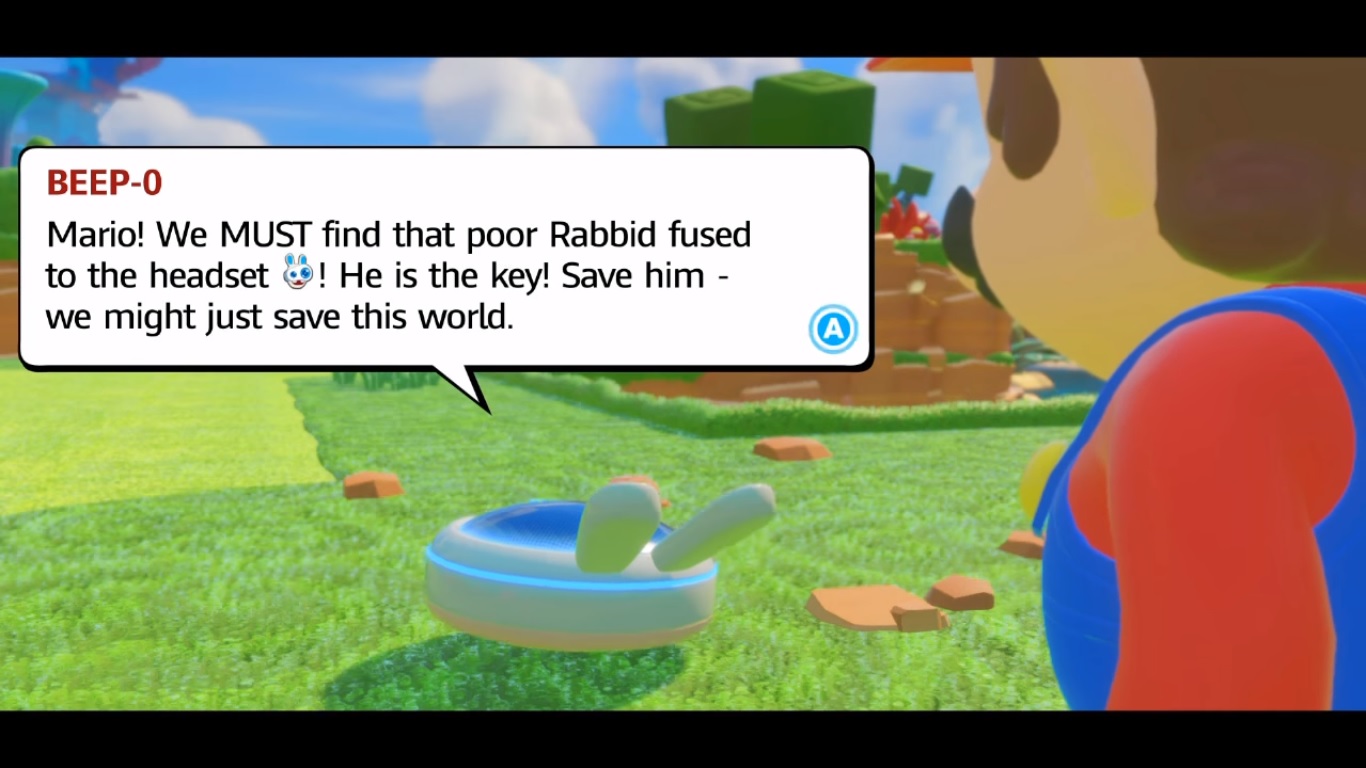
The game’s soundtrack shares a similar lack of originality. While many of composer Grant Kirkhope’s tracks are beautiful pieces that pay homage to the charming Mario music of Koji Kondo, those that are unique to the game are a letdown. At best, these original compositions are pleasant and harmless. They give off more of a Banjo-Kazooie vibe than Mario, which should come as no surprise, given that Kirkhope composed the Banjo games as well as the recent Yooka-Laylee.
Therein lies the problem, however. The music just doesn’t jive with the Mario franchise. At worst, these tracks are bland and uneventful, unworthy of the legendary kingdom and characters that they accompany.
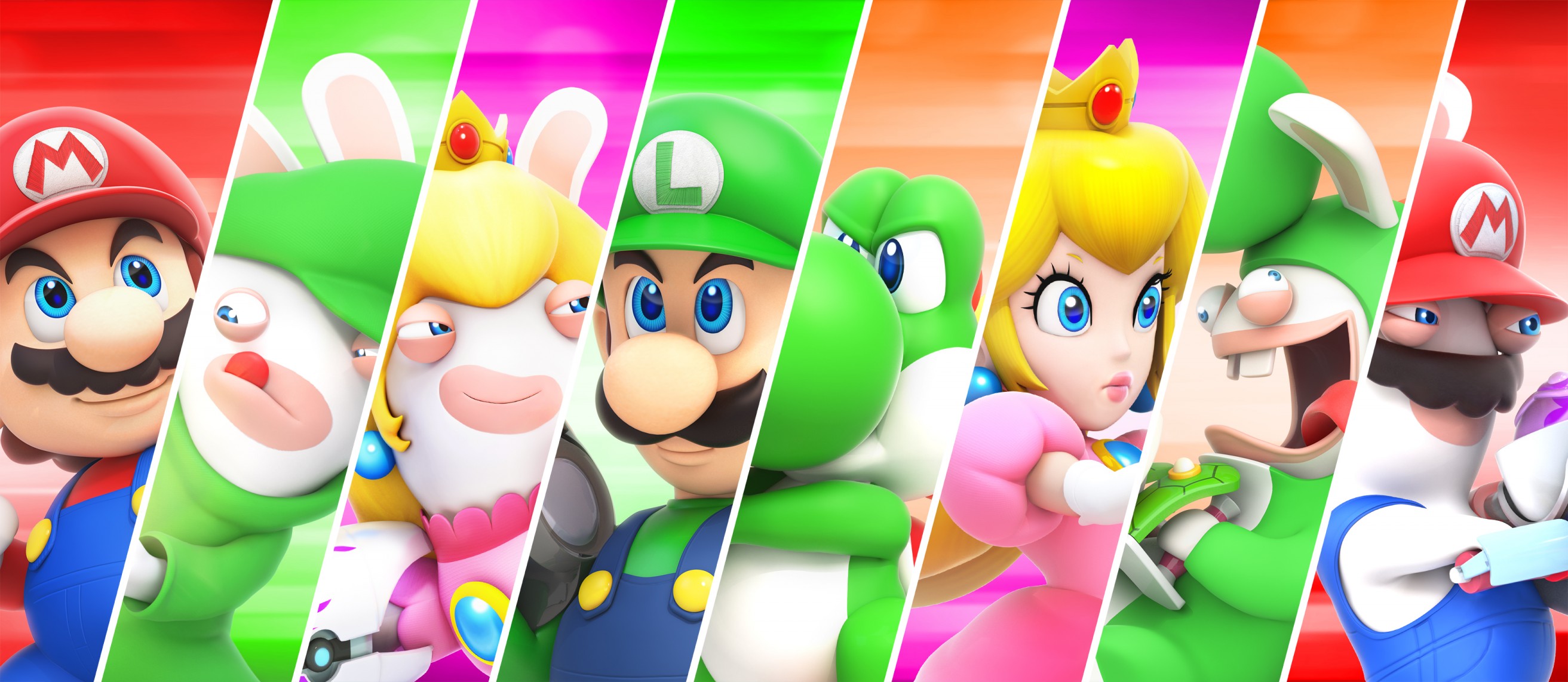
Final Thoughts
Mario + Rabbids: Kingdom Battle is an impressive foray into the world of turn-based strategy games. Bundling much of the strategic depth of XCOM with the accessibility of a Mario game, Ubisoft has crafted an excellent package that serves as one of the Switch’s finest titles to date. With its pleasant story, humorous characters, and rewarding gameplay, Kingdom Battle pays clever homage to the iconic plumber while carving out a surprising niche of its own. Breath of the Wild and Super Mario Odyssey might be Nintendo’s 1-2 punch for 2017, but make no mistake: Kingdom Battle is a worthy contender in its own right.
Score: 9.0/10
David is the founder of The Punished Backlog. He has a problem finishing games he starts.
Just beat: Yakuza 0, Sleeping Dogs.
Working on: Demon Tides, Ys VIII.
Can't wait for: GTA VI.
Follow David on Twitter at @David_Silbert to keep up to date with all things The Punished Backlog.


